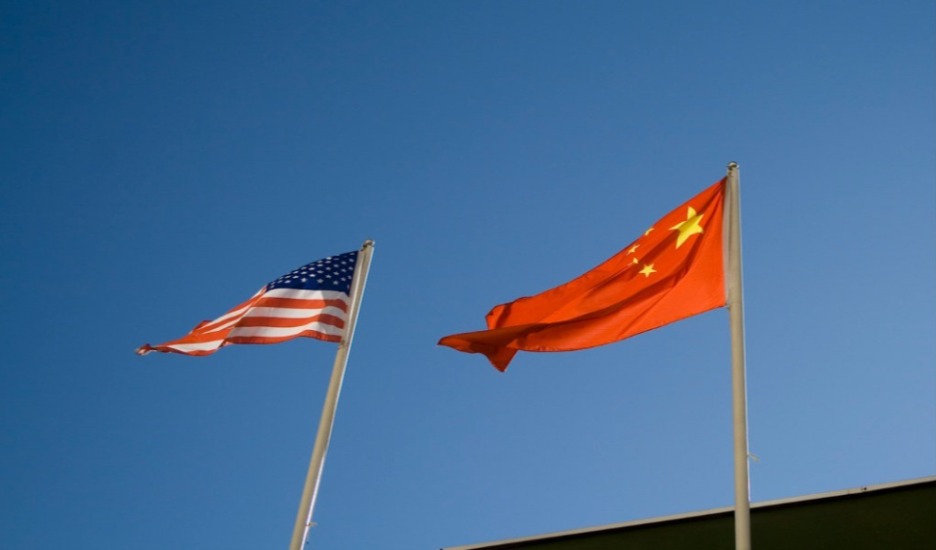Water Wars: The Arbitral Tribunal Ruling Turns 1
Published by The Lawfare Institute
in Cooperation With

Assessing the Impact One Year On, and Projecting What the Future May Hold

Photo: AFP
One year ago, an ad hoc arbitral tribunal composed under Annex VII of UNCLOS issued a sweeping decision regarding the South China Sea territorial dispute. Last week marked the decision’s first anniversary and spurred analysts to reflect on the parties’ responses and what they mean for the future of the region. Here, we’ll summarize their reflections and collect some of Lawfare’s best analysis on the subject from the past year.
Following a period of elevated tension, the tribunal’s decision represented a sweeping victory for the Philippines and a stern rebuke to China. The tribunal ruled on several points at the heart of the dispute. First, China’s historical claim to the territory within the “Nine-Dash Line,” a vast area that encompasses most of the South China Sea, is invalid due to China’s adoption of the United Nations Convention on the Law of the Sea (UNCLOS) in 1982. Second, the land features in the Spratly Islands are not “islands” per the treaty, and thus do not generate exclusive economic zones (EEZs). Third, certain of these features fall within the Philippine EEZ, and China’s aggressive activity in the region violated the Philippines’s territorial rights. Finally, China’s failure to cease this activity during the arbitral proceedings violated its obligations under UNCLOS.
Soon after the decision was issued, the Philippines lauded the tribunal’s “significant” ruling, while China called it “nothing more than a piece of waste paper.” As Robert D. Williams wrote at Lawfare at the time, the decision was an “across-the-board win” for the Philippines, and some believed it had the potential to catalyze a shift in the regional status quo.
But that didn’t quite happen. Instead, as Lawfare’s Julian Ku points out, China has “transform[ed] its legal defeat into a political victory” while simultaneously flouting the tribunal’s ruling. In the decision’s wake, Philippine President Rodrigo Duterte appeared to withdraw from the United States, a longtime ally, and moved closer to rapprochement with China. China’s dangling of some $24 billion in aid and investment likely influenced Duterte’s hesitance to enforce the ruling. As Ku notes, “[i]nternational law seldom enforces itself,” and here, the failure of the U.S. and the Philippines to hold China accountable for its failure to comply with the decision likely weakens the decision’s significance.
On the ruling’s first anniversary, though, analysts remain divided over its ramifications, and over the source of the present calm in the region. Writer Bill Hayton offered an optimistic view, arguing that China has actually taken steps to comply with certain portions of the ruling and that its efforts represent a moderate shift in its legal position. He says that while China “is still some way from total compliance,” it is “clearly not deliberately flouting the ruling.” CSIS’s Bonnie Glaser disagreed, citing Ian Storey’s more cautious take. Storey says that despite an agreement on a Framework Code of Conduct and relatively few major incidents, the region’s lowered tensions simply reflect the cyclical nature of conflict: “[G]iven the unchanging central drivers of the conflict and the absence of collective political will to palliate those drivers and negotiate an equitable solution, periods of calm are invariably followed by strong tempests.” While many cite the Code of Conduct progress and the relative calm as proof of a permanent shift in the regional dynamic, Storey says that because “the central drivers of the dispute—nationalism, competition over resources and geopolitics—remain unchanged . . . choppier waters are almost certainly before us.” Other notable takes include Mark J. Valencia’s FONOP critique and his insistence that “Beijing now calls the shots in the South China Sea,” and an analysis of an internal Chinese military report on the South China Sea dispute, which indicates that China’s regional strategy is “expansionary in aim, incremental by design and realist in orientation.”
The Philippines’s Department of Foreign Affairs noted the anniversary but downplayed the ruling and insisted that “the spirit of good neighborly relations” is the key to resolving the conflict. Citing China’s investment commitments, the Framework Code of Conduct, and China’s decision to open the Scarborough Shoal to Philippine fisherman as proof that “the Philippine approach” (perhaps as opposed to the more muscular American approach) will prove successful.
In Other News…
United States
On July 6, two US B-1B bombers out of Guam flew a bilateral training mission with Japanese fighters over the East China Sea and down to the South China Sea. This was the first time such a combined mission had been conducted at night, and was intended to demonstrate the United States’ “seamless” interoperability with allies and commitment to exercising freedom of navigation.
China
The PLA Daily, the official newspaper of the People’s Liberation Army, reported last week on a significant upcoming restructuring of the Chinese military. The military reforms are expected to reduce the active PLA Army to fewer than one million troops and increase the size of the PLA Navy, PLA Strategic Support Force, and PLA Rocket Force.
On Tuesday, China dispatched by sea the first contingent of PLA naval forces to establish and occupy its first overseas base in Djibouti. The stated purpose of the facility is to support anti-piracy, U.N. peacekeeping, and humanitarian relief missions in Africa and western Asia. China has previously deployed forces to the region for specific missions and now joins the United States, France, Britain, and Japan in having forces stationed there.
Vietnam
Last week, Vietnam granted Indian oil firm ONGC Videsh a two-year extension to explore oil block 128 in the South China Sea. The concession, which straddles China’s declared “nine-dash line,” was first granted to India in 2006 but had been due to expire in mid-June. The extension announcement came days after an annual meeting between ASEAN members and India, at which Vietnamese Foreign Minister Pham Binh Minh expressed hope that Vietnam and India would continue to cooperate on “promoting strategic security and freedom of navigation in South China Sea on the basis of international law and legal conventions.”
Philippines
An official with the Philippine Department of Energy's Resource Development Bureau told reporters on Wednesday that drilling for oil and natural gas on the Reed Bank in the South China Sea may resume before the end of this year. The Philippines suspended exploration at the Reed Bank, in waters contested by China, in late 2014 ahead of international arbitration proceedings.
Indonesia
On Friday, the Indonesian Ministry of Maritime Affairs unveiled a new official map in which the northern reaches of the Indonesian exclusive economic zone in the South China Sea are renamed as the North Natuna Sea. An Indonesian expert on the Law of the Sea called the move a “big step by Indonesia to state its sovereignty” that sends “a clear message, both to the Indonesian people and diplomatically speaking.” Chinese Foreign Ministry spokesman Geng Shuang responded later that day, saying “[t]he so-called change of name makes no sense at all and is not conducive to the effort to the international standardization of the name of places.”
Analysis, Commentary, and Additional Information
On Asia & the Pacific Policy Society’s Policy Forum, Anthony Bergin of the Australian National University National Security College, responds to an earlier post by Marina Tsirbas, also of ANU, about fisheries stock depletion in contested waters in the South China Sea. Tsirbas had highlighted the unsustainable rate of depletion and destruction and called on regional states to adopt a legally binding fisheries management regime. Bergin follows up with several obstacles that might impede such a regime, including the question of Taiwanese membership and lack of buy-in from regional civil society and environmental groups, but also expressed optimism that Australia could play a constructive role by acting as an “honest broker” between affected nations and providing relevant technical expertise.
In the New Eastern Outlook, an online journal published by the Institute of Oriental Studies of the Russian Academy of Sciences, Joseph Thomas asserts that, contrary to the dominant narrative in the US and European press, the Trump Administration’s ASEAN policy isn’t “confused” or “unclear. Rather, “it is a very clear continuation of a pattern of coercion seeking to maintain what US policymakers and politicians themselves have claimed is American “primacy” across Asia.”
Hai Hong Nguyen of Queensland University of Technology discusses the growing ties between the US and Vietnam, and President Trump’s planned attendance to the APEC Forum in Da Nang in November. Nguyen writes that the forum provides “an auspicious opportunity” for Trump to reinforce the joint statement issued after Vietnamese Prime Minister Nguyen Xuan Phuc’s visit to the White House at the end of May and reassure allies in Asia that the United States is not pivoting away.
Finally, on the Lowy Institute’s The Interpreter blog, Nonresident Fellow and retired Royal Australian Navy Rear Admiral James Goldrick analyzes the China-Russia bilateral naval exercise “Joint Sea 2017.” The Baltic Sea exercise, he argues, suggests that “China can match in Europe their efforts at maritime presence in East Asia” and that there is “an emerging alignment between China and Russia on China’s behaviour in the South China Sea and Russia’s approach to security in the Baltic.”
Water Wars is our weekly roundup of the latest news, analysis, and opinions related to ongoing tensions in the South and East China Seas. Please email Sarah Grant with breaking news, relevant documents, or corrections.



.jpg?sfvrsn=5a43131e_9)


